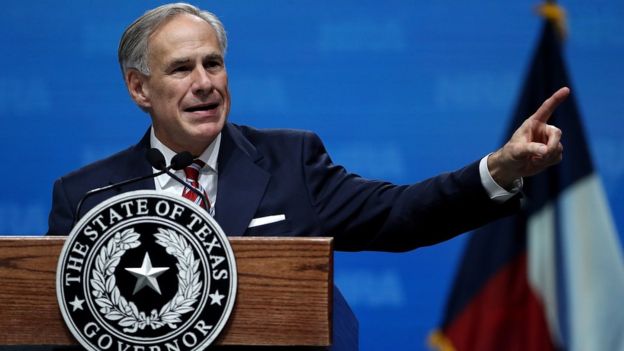'It would be a disaster for Texas'
Content by: James Jeffery, posted on May 17, 2018
Originally published at: http://www.bbc.com/news/business-44108760
As trucks endlessly rumble up and down Interstate 35 in southern Texas, the importance of the state's trade with Mexico is obvious.
Full of freight, the lorries are making their way to and from the Texan border city of Laredo and its crossings into the US's southern neighbour.
Texas is in fact the US's largest exporter, and Mexico is its biggest overseas market. Last year Texas exported $97.3bn (£71.6bn) of goods and services to its southern neighbour, 37% of its overseas sales.
Unsurprisingly, many businesses in the Lone Star State are worried that President Trump's "America first" economic policies could harm trade between Texas and Mexico.
Most pressingly, they are concerned by Trump's continuing hostility towards the North American Free Trade Agreement (Nafta) between the US, Mexico and Canada. Trump has demanded this be renegotiated, or else he says the US will pull out.
Image copyrightGETTY IMAGES
Image captionMr Trump hasn't minced his words about the current Nafta agreement
Last week President Trump again voiced his unhappiness, saying Nafta, which has been in place since 1994, "has been a horrible, horrible disaster for this country". He says it has cost US jobs and he wants some tariffs and other barriers put in place.
As talks are continuing between US, Mexican and Canadian representatives to secure a new Nafta deal, many Texan firms are keeping their fingers crossed that an agreement can be reached, and one that is as similar to the existing accord as possible.
"[Talk of] wholesale scrapping of one of the great trade agreements in the history of trade is unwarranted posturing," says Ray Brimble, founder and boss of Austin-based logistics company Lynxs.
"If the president is serious about scrapping it, that would be a disaster for Texas."
He adds that such is the level of economic integration between Texas and Mexico that the main airports in Dallas and Houston are now part of Mexico's logistics network.
Image copyrightRAY BRIMBLE
Image captionRay Brimble says that scrapping Nafta would be "unwarranted"
"It is a commercial ecosystem that has developed almost naturally, and not because of any politicians. It is a win-win for both countries."
Sergio Rosas, chief executive and founder of Texan video games company CGbot, is another boss hoping for a new Nafta agreement that is as open as possible.
While the business has its headquarters in Austin, Texas's capital, it has a large production studio in the Mexican city of Monterrey.
"The [two-location] mix means that we feel local to companies in Austin that use us, while we can take advantage of the talent and cost advantages in Mexico," he says.
"In Austin, even if you could afford the talent, much of it is tapped out."
Image copyrightCGBOT
Image captionVideo games firm CGbot has US and Mexican offices
Mr Brimble adds that Texas's Republican state government should be doing more to defend Nafta, but accuses them of not doing so sufficiently out of loyalty to Mr Trump.
"I think politicians are putting politics in front of defending Texas business people," he says.
"Texas politicians' position should be to improve and prolong Nafta, but they seem to be trying to show party solidarity, and are not speaking up."
Yet despite Mr Brimble's comments, Texan Governor Greg Abbott has indeed been defending the existing trade deal.
Image copyrightGETTY IMAGES
Image captionTexan Governor Greg Abbott has said Texas benefits from Nafta
Mr Abbott recently wrote that "since Nafta took effect, Texas exports to Mexico have increased by 13% annually".
He added: "This organic growth in exports stems from the stability inherent in a long-term trade agreement... Today, Texas' unemployment rate is at an all-time low, thanks in large part to more than one million Texas jobs that depend on Nafta."
Meanwhile, Texas' Secretary of State Rolando Pablos - whose remit includes advising the governor on Mexican affairs - tells the BBC that the benefits of Nafta should not be lost in any new deal.
"We support the current renegotiation process, and understand the need to update Nafta to reflect changes in critical areas such as e-commerce and energy, while simultaneously urging negotiators not to 'fix' the part of the agreement that are not broken," he says.
As trade talks continue between the US, Canada and Mexico, the mood in the Texan business community remain cautious.
"The relationship [between Texas and Mexico] will continue to grow," says Alex Suarez, a lawyer and businessman who works between Austin, Houston and Mexico.
Image copyrightGETTY IMAGES
Image captionTrade between the US, Canadian and Mexican trade representatives, pictured, are ongoing
"Unfortunately though, I think there will be more obstacles, and they will be created by the government [in Washington]."
His thoughts are echoed by Fred Schmidt, direct of international affairs at Capital Factory, a technology incubator and co-working space in Austin.
"We [in Texas] are very caught up in trying in maintain normalised relationships with friendly business partnerships in the south [Mexico], while Washington is damaging them as well as globally."
Interstate 35 - that runs north through Texas and then almost all the way to the Canadian border, is often called the "Nafta Superhighway".
It may soon need a new nickname. But Texan businesses are hoping that when the dust of the renegotiations settles, the trucks will still be rumbling along.






